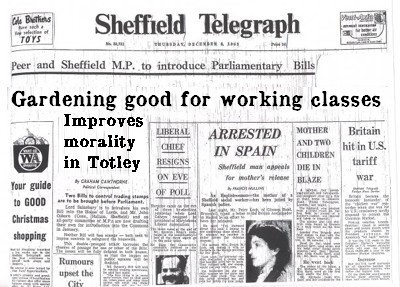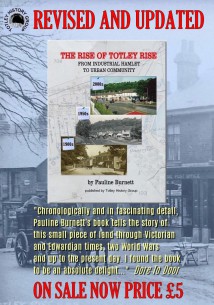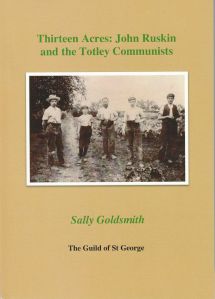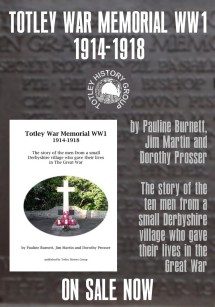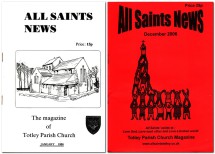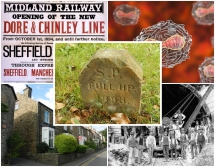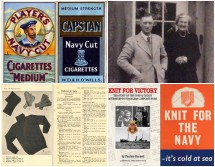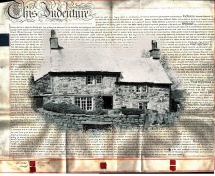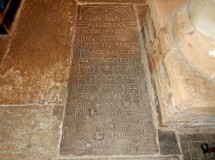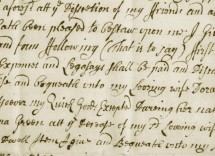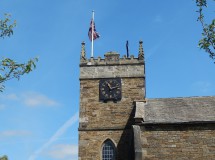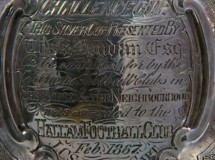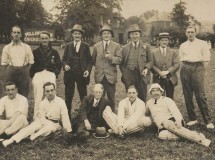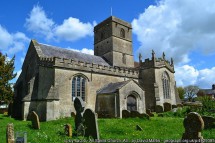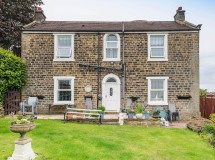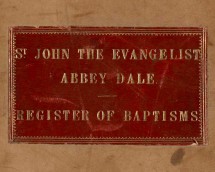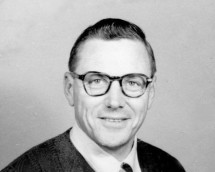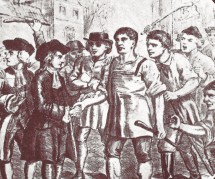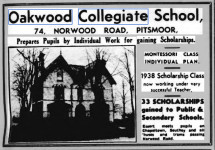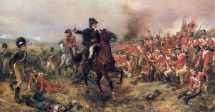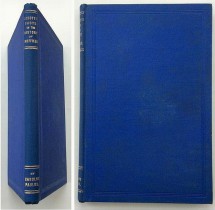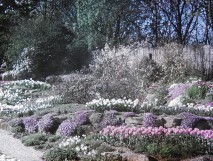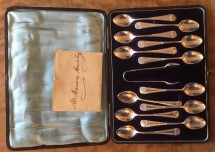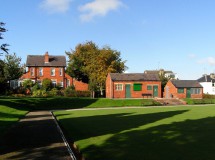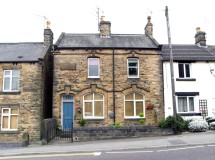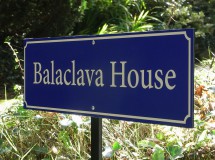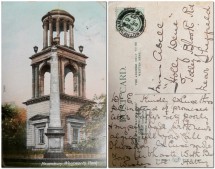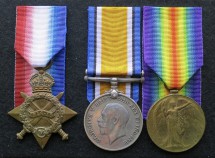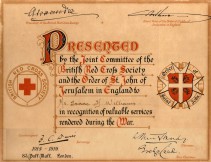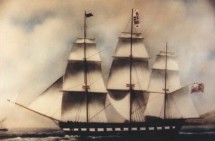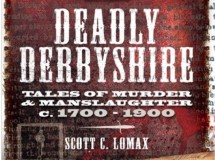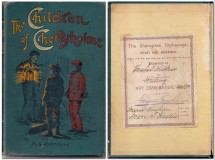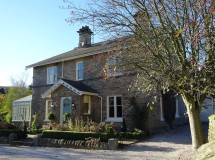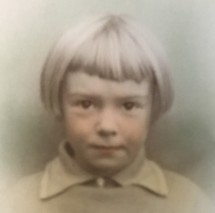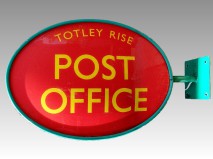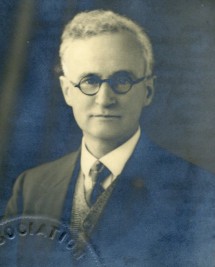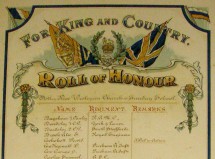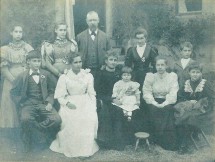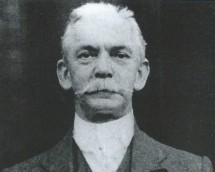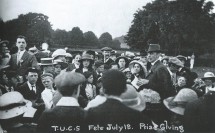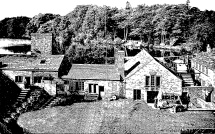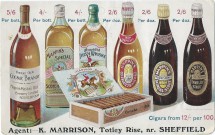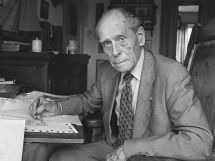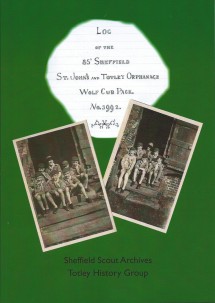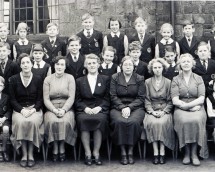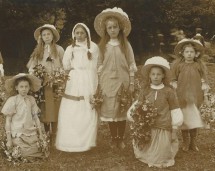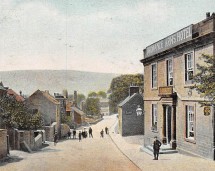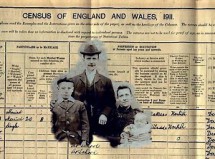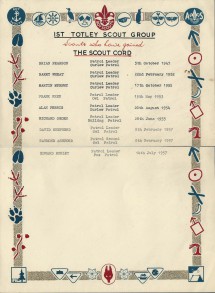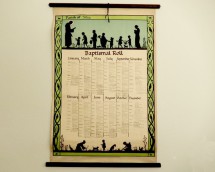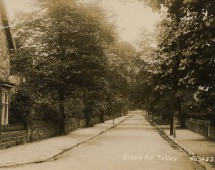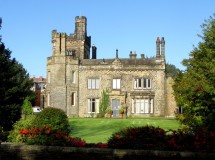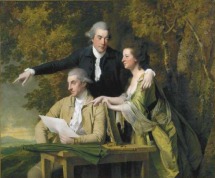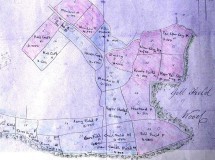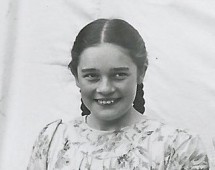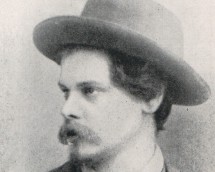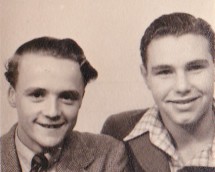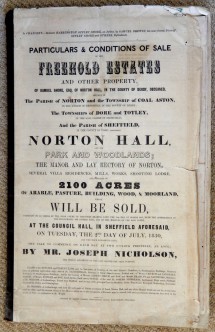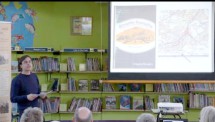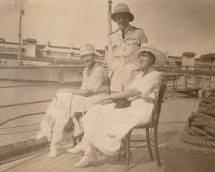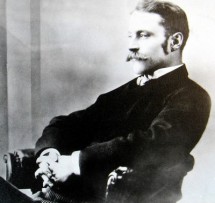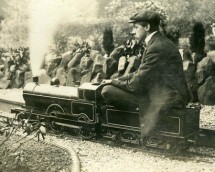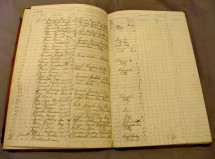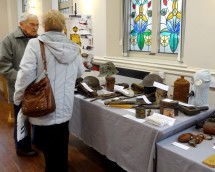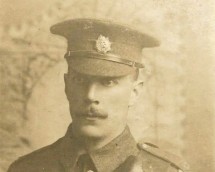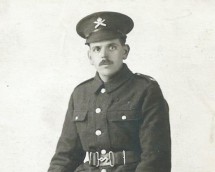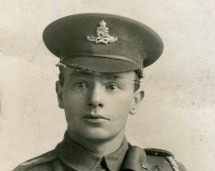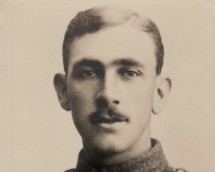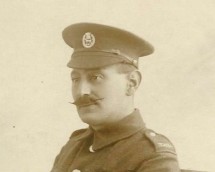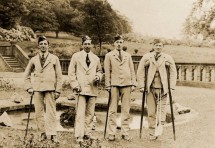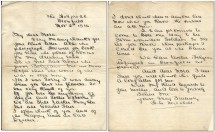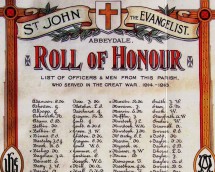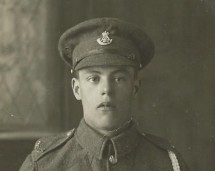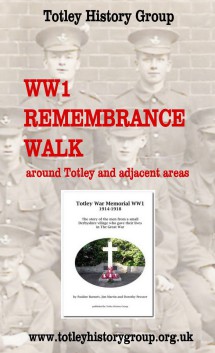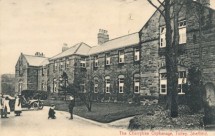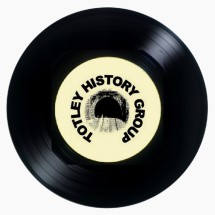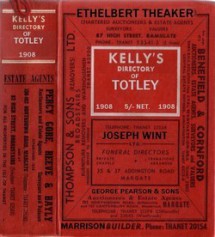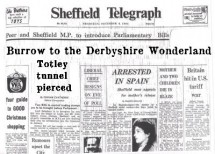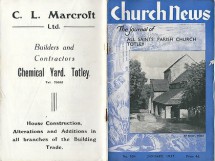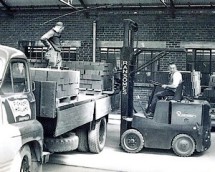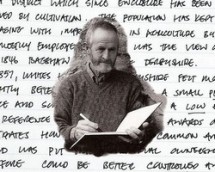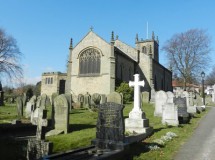Newspaper Archive: 1860s
Saturday 17th March 1860 Sheffield Independent
Twenty Pound Reward.
Whereas some evil and disposed Person or Persons did on Thursday night 8th inst. or early Friday morning the 9th wilfully and maliciously cut the Pit Rope belonging to
Mr. John Wilbraham at the Colliery Dore, and person who shall give such information as shall lead to the conviction of the offender or offenders shall receive the above reward viz. £10 from
Ringinglow Association of the Prosecution of Felons and £10 from Mr. John Wilbraham. Information to be given to the superintendent of Police, Dronfield or to Jas Ball, Police Constable of Dore and
Totley.
Saturday 30th March 1861 Sheffield Independent (page 8)
Sheffield Guardians—The following is the complete list of nominations for the Sheffield Union :—
Sheffield.
Mr. C. Leonard, printer, Waingate.
Mr. Joseph Mountain, plumber, Waingate.
Mr. John Watkinson, agent, St. George's terrace.
Mr. George Bassett, confectioner, Park.
Mr. Joseph Hallam, needle manufacturer, Park Farm.
Mr. Francis Colley, leather dealer, Market place.
Mr. Robert King, printer, Granville street.
Mr. John Tasker, gutta percha merchant, Angel street.
Mr. Thos. Flint, tailor, Westbar.
Mr. Thos. Youdan, Surrey Music Hall.
Mr. Joseph Ashforth, manufacturer, Rock street.
Mr. James Burgin, tailor, &c., George street.
Mr. Wm. Stacey, music dealer, West street.
Mr. John Eaton, pawnbroker, Broad street.
Mr. Hy. Crawshaw, druggist, Moorfields.
Mr. John Bland, Brunswick Hotel, Old Haymarket.
Mr. Wm. Muddiman, boot and shoe maker, Angel st.
Mr. John Hunsley, innkeeper, Castle street.
Mr. John Crossland, manufacturer, Park hill lane.
Mr. Thomas Parkin, maltster, Rock street.
Mr. Joseph Whewall, hosier, Angel street.
Mr. Alexander Neil, tailor, Change alley.
Mr. Thomas Peel, pork butcher, Westbar.
Mr. J. Plant, victualler, Broad street.
Mr. Thomas Appleyard, grocer, Haymarket.
Mr. Edwin Hall, hosier, Snighill.
Mr. Thomas McGivern, cutlery dealer, Snig hill.
Mr. G. A. Bridges, hatter, Angel Btreet.
Mr. Thomas Clifford, draper. Angel street.
Mr. Thomas Bourne, hosier, Castle street.
Mr. Michael Beal, watchmaker, Market place.
Mr. Wm. Eaton, dining rooms, High street.
Mr. Jph. Hadfield, marble warehouse, Eyre street.
Mr. G. Roper, druggist, Intako road.
Mr. J. S. Birks, grocer, Market place.
Mr. John Askham, table-knife manufacturer, Broad ln.
Eighteen other gentemen, including Ald. Saunders and Mr. Wm. Hutchinson, were nominated, but have withdrawn their names. Other gentlemen intending to withdraw, should do
so before Tuesday next. A most absurd course has been pursued with regard to the nominations, some of the candidates having been nominated by as many as 38 persons.
For Brightside, which has two guardians, the nomination are: - Messrs John Jones and G. Scorah, the retiring guardians; and Mr. Wm. jarvis, of Pitsmoor,
gentleman.
For Handsforth, which has only one guardian: - Mr Edward Holmes, nurseryman, Handsworth; and Mr. John Bland, Brunswick Hotel, Old Haymarket, Sheffield are
nominated.
For Attercliffe: - John Rhodes is re-elected without opposition.
Saturday 20 April 1861 Sheffield Independent (page 6)
Dore. On Monday afternoon last, the first stone of an infant school was laid by John Roberts, Esq., of Abbeydale, in the
presence of a numerous assemblage. On the same evening, a concert was given in the school room, in aid of the fund for the erection of the infant school. The principal vocal parts were sustained by
Miss Warburton, Messrs. Hammerton, (basso) J. Nicholson, J. Ward, Kirk, J. Warburton, Osborne, Cumming, and Birtles. The instrumentalists consisted of Messrs. J. T. Hill, (leader), W. Furniss, Tyler,
violins. Flutes.- Messrs. T. Froggatt, Eyam, and Marples. Violoncellos. - Messrs. J. Linneker, and J. Furniss, Norton. Double bass. - Mr. G. Shaw, Barlow. Cornopean. - Mr. John Revitt. Piano. -
Miss Warburton, and Mr. T. Osborne all executing the parts committed to them with very great zeal and ability. Miss Warburton’s performance gave great satisfaction, and Messrs. Nicholson,
Birtles, and Hammerton were heartily encored. The band under the leadership of Mr. Hill, played the overtures and concerted pieces in a very gratifying manner. Among the company were the Mayor of
Sheffield and family, Mrs. Waterfall and friends, Mr. and Mrs. Newbold, of Abbeydale Grange, John Roberts, Esq., J. G. Waterfall, Esq., the Rev. E. B. Chalmers, and family. A very handsome sum was
realised, and the performers very liberally gave their services without even being reimbursed their expenses.
Saturday 23rd November 1861 Derbyshire Times and Chesterfield Herald (page 3)
William Crofts Sheffield was charged by P.C. James Ball, Totley, with being on the premises of Mr. Geo. Osborne a Dore Farmer. The prisoner with another man were seen by
Ball about 3am this Wednesday morning prowling about with a gun. He watched them and then walked up to them, when he had a struggle with them. He took Crofts and the gun which was loaded but the
other escaped. Committed for 3 months with hard labour.
Wednesday 8th January 1862 Derby Mercury (page 5)
William Cox and Tom Conners navvies were apprehended by Constable Ball of Totley for stealing a handkerchief containing six quires of writing paper and several packets
of envelopes and dozen of buttons and several boxes of steel pens the property of Geo. Mayfield at Baslow - Remanded for 1 week.
Thursday 12 June 1862 Sheffield and Rotherham Independent (page 2)
Five Pounds Reward - Wanton Mischief.
Late on Tuesday night or early on Wednesday morning, 10th or 11th inst. some evil-disposed Person or Persons threw the Stone Balls from the Gate Posts lately erected by
Mr. Roberts at the entrance to his Grounds, Abbeydale Park; also one from one of the Posts in front of the House, thereby doing considerable damage to the Stone Work. Any Person giving to Mr. Roberts
or the Rural Police such information as shall lead to the conviction of the Offender of Offenders , shall receive the above Reward.
Saturday 12th July 1862 Supplement to The Sheffield and Rotherham Independent (page 12)
Marriages
Wing-Wilson. On the 7th inst., at the Parish Church, Doncaster, by the REv. Vaughan, vicar, Mr. John Unwin Wing, accountant, Sheffield, to Jemima Jane,
eldest daughter of the late Mr. Robert Wilson, of Barnby, near Howden, Yorkshire.
Tuesday 29 March 1864 Sheffield Daily Telegraph (page 8). [Extract only]
Nomination of Guardians
The following gentlemen have been nominated as Guardians:-
Brightside - Wm. Jarvis, Pitsmoor; Thomas Jowitt, Crabtree; George Scorah, Spital-hill; Joseph Mountain, Grimesthorpe; and John Martin Stanley,
Woodhill. Those gentlemen who do not intend to stand for election should withdraw their names before Thursday next.
Tuesday 10 May 1864 Sheffield Daily Telegraph (page 4)
To be Let, Green Oak House, with Stabling and Carriage Houses &c. This desirable Residence is pleasantly situate on the Abbeydale-road, near
Totley. The Mansion has a southern aspect, and commands one of the finest Views in the neighbourhood, and the air is remarkably salubrious. Attached to the house is a large Garden with Lawn and
Shrubbery; and a quantity of Land, from one to forty acres, might be had if required. An eligible Tenant will be liberally treated with. Apply to John Roberts, Esq., Abbeydale Park; or to Messrs.
F.E. & S. Smith, Estate Agents, 1, George-street.
Tuesday 20th September 1864 Sheffield Independent (page 8).
In the evening about 50 of the subscribers sat down to an excellent dinner at the Devonshire Arms. W.B.Fernell Esq. Sheffield presided and the Vice Chair was occupied by Mr. Furness. After the usual toasts the Chairman proposed success to the Dore, Totley & Ecclesall Horticultural Soc. and in doing so referred to the very great benefit conferred on the district by the establishment of such a society. The industrious working classes could thus occupy their time in cultivating their gardens, and were able to refrain from unseemly indulgence and by their conduct elevated the morality and intelligence of the district Mr. Hancock responded to the toast, and referred to the history of the society.
The other toasts were "The exhibition" proposed by Mr. Miller, "The Judge"proposed by Mr. Hancock and responded to by Mr. Wildgoose and "The Patrons of the
Society"proposed by Mr. Furness. After the dinner proceedings had concluded a dance was held and a goodly number indulged in the amusement.
Tuesday 28 March 1865 Sheffield Independent (page 5)
Nominations for Guardians of the Poor
Nominations for the approaching election of Guardians, closed last night. For the Sheffield Township they were as follows: Messrs. G. L. Saunders, Joseph Hallam, Richard
Searle, Wm. Stacey, G.A. Lockwood, John Cooper, Joshua Fawley, Fretwell Hudson, Thomas Appleyard, Joseph S. Birks, John Bradwell, Thomas Jackson, William Booth, William Foster, jun., John Bland,
Joseph Mountain, Edward Drabble, John Hall, Jospeh Eli Grundy, George Bassett, Joseph Redfern, Joseph Whewell, Thomas Youdan, Thomas Myers, William
Wigfall, Charles Butler, Joseph Pell, Thomas Peel, Edward Courtnall, James Wing, John Hill, Robert Younge, Henry Hutchinson, Samuel Roberts, Henry Nowill, John Unwin, William
Jeffrey, Benjamin Ashton, William Wright Marshall, John Starbuck, and John Tasker. - Brightside Bierlow: Messrs. Wm. Jarvis, George Scorah, William Barker, Joseph Ashforth, and John Martin Stanley. -
Attercliffe: Alfred Jackson. - Handsworth: Edward Holmes. Mr Youdan has sent in his refusal to serve.
Tuesday, 2nd January 1866 Sheffield Daily Telegraph
Riotous Assembly at Totley
John Fearney, David Johnson, Thomas Williams, John Birks, Thomas Lanack, and Edward Fearney, were charged by John Green, with the above offence. --Mr Chambers who
appeared for the complainant, stated that on Thursday, the 21st, a very riotous assembly met at the house of John Green, publican, of Totley. He stated that John Fearney and Harriet Fearney had lived
with John Green, she being the daughter of John Green, and the complainant wished them to leave his home. They refused, after that they left. On the day in question, four men entered the house, and
asked for a quart of beer each, which was given to them. After this, Mrs. Fearney came, with some seven others, and began to strip the house, and filled one or two carts with the goods, and the
parish constable and county police were sent for. --Samuel Green (the younger) said on Thursday he was left in charge of the house, which is the Fleur de Lis, Totley, his father, Samuel Green, the
son of John Green, the publican, being at Sheffield (john Green being the grandfather of one and father of the other), and that about five o'clock in the evening four men entered the house as before
stated, and commenced a disturbance. His grandfather ordered him to put them out. While trying to do so his father returned, and they succeeded, but not until fire-arms had been produced on each
side, but fortunately not used. After that he went out and returned with the parish constable, and had just got inside the door and fastened it when the door was burst open, and seven other men, with
Mrs. Fearney, rushed in, saying they were Fenians from Sheffield. Mrs. Fearney said she had come for what belonged to her. I asked what she wanted. She said she would tell them when she had got it.
She also told the men to take no notice of me, and that the men had been engaged in Sheffield for the purpose by John Fearney, at five shillings each; they were what are termed roughs; two had black
eyes. --Mr. Fernell, who appeared for the defence, said that this was a family quarrel; that John Fearney and Harriet Fearney were forced out of the house without their goods, and they had come for
them. --The case was adjourned to Monday, the 15th, at Hemsworth, each defendant in a £10 bond.
Saturday 6 January 1866 Sheffield Independent
Family Amenities at Totley
A Fenian Exploit.
Thomas Lanack, David Johnson, Thomas Williams. John Birks, John Fearney and Edward Fearney were charged by Samuel Green, the elder, with having riotously assembled
together; and Mrs. Fearney was charged on a peace-warrant at the instance of Samuel Green, the younger. --Mr. Chambers was for the complainants, and Mr. Fernell appeared to defend the Fearneys. --
This case arose out of a family quarrel, and the whole circumstances, as stated by Mr. Chambers and witnesses, may be summed up in the following narrative. The two Samuel Greens are son and grandson
of John Green, who keeps the Fleur de Lis inn, Totley; and Harriet Fearney is John Green's daughter, John Fearney is her husband, and Edward Fearney is their son. As may be supposed, this was not the
first act of the quarrel, which had been nursed with great care and attention for some time previously. In consequence of this chronic unpleasantness John Green begged his daughter and her husband,
to leave the house. At first they refused, but afterwards they left, not, however, before Fearney, the son-in-law, had been summoned before the Bench, and bound over in his own recognizances to keep
the peace. They left without taking any furniture with them, and the row now in question arose out of an attempt to take possession of the furniture which they claimed. On the 21st of December, Mrs.
Fearney, her husband being outside of the house, introduced a number of Sheffield roughs into the Fleur de Lis, who announced that they were Fenians (it was a Fearneyan quarrel), and conducted
themselves in the manner and with the language of the roughs of the period. They would have gone upstairs where John Green was lying dangerously ill, but that Samuel Green, the elder, produced
firearms, and swore that he would lose his life before they should disturb his father. Thereupon the self-styled Fenians produced revolvers, and said they had also come provided. They could not get
any beer in the house, but they sent out for several gallons of ale, and inflamed their Fenian courage by getting half drunk. The next move was to strip the house of furniture, which was done, and
two carts were loaded with the loot. Mr. Chambers stated that the only things belonging to Fearney and his wife were a clock, two cases of stuffed birds, a rocking chair, and a small spring stand.
While the furniture was being removed some county constables came up, an officer having heard at Millhouses that a party of Sheffield roughs had gone up to Totley, and that in all probability there
would be bloodshed. The police took down the names of the men, but some of them (the Fenians) gave false names and addresses. These men did not now appear, only the Fearneys being present, but the
police were confident of being able to find them. One of the roughs (Lanack) was heard by the police to say that they had been engaged at 5s. and their "lush" to come from Sheffield and put Mrs.
Fearney and her husband in possession of the furniture. They came in a cab from Heeley, and the cab driver's name was Wood... Mr. Fernell said it was only fair to the Bench that they should know that
after John Fearney was bound over to keep peace four or five roughs were employed by the Greens to turn Mrs. Fearney and her husband out of the house, that they were turned into the street, and were
refused even their clothes.... This of course had nothing to do with the present case... Mr Fernell then wished to put in a copy of John Green's will, showing that the furniture taken away belonged
to the Fearneys; in this, however, he was stopped by the trifling circumstance that John Green was not yet dead.....Mr. Chambers called evidence, and asked for a remand, for the purpose of giving the
police time to capture the Fenian roughs at large, --The Bench remanded the further hearing of the case till the 15th inst., at Hemsworth, and Mr. Fernell, to the dismay of the court, promised that
all the facts should then be gone into.....The separate charge against Mrs. Fearney was then investigated. Samuel Green, the younger, who is a cripple, swore that his aunt, Mrs. Fearney, had used
threats towards him, and that he went in fear of her, and she was ordered to enter into her husband's recognizance of £10 and one surety of £5 to keep the peace.
Saturday 13th January 1866 Sheffield Independent (page 8)
Cutting Underwood
Yesterday an old offender named William Marsden of Totley labourer was committed for 3 calendar months with hard labour by P.W. Bagshaw Esq. at the Oaks for cutting underwood doing damage to the amount of 4s in a wood belonging to F. L. D'Ewes Coke Esq of Totley on 22nd December last. The man escaped at the time and has since been apprehended on warrant. He has been previously committed for similar offences.
Saturday 13 January 1866 Sheffield Daily Telegraph
Extraordinary Charge of Assault
Samuel Green and Abraham Green, were brought up in custody and charged with assaulting John Fearney. --Mr. Fretson appeared on behalf of the complainant, and Mr. Chambers
appeared for the defendants. --The parties concerned are all relatives, and the affair appeared to have arisen in the first place out of family squabble. --Mr. Fretson stated that at an early hour
that morning the complainant, who had on a recent occasion been engaged in a case at the Eckington Petty Sessions, met the defendants with a large load of furniture. It was dark, and when they came
up to him one of them discharged a pistol at him twice, assaulted him, and used considerable violence against him. The assault took place near Sheffield moor, and was witnessed by the complainant's
wife and son. As there had not been time to get up the case and summon the witnesses, he had to ask for a remand. --Mr. Chambers objected to a remand, and urged that the real offender was the
complainant himself, who ought to occupy the place where the two defendants were put. The fact was the grandfather of the defendants occupied a public house, which the complainant had lived at, and
assisted him with. He had, however, so misconducted himself that he had to be turned out, and it was at the request of the old man that the defendants were removing the furniture, when the
complainant met them and himself fired a pistol at them. The complainant had already been bound over to keep the peace. --The bench, after a lengthy inquiry, decided to bind both parties over to keep
the peace, and the defendants were ordered to find sureties.
Tuesday 16 January 1866 Sheffield Independent
Hemsworth
The Riotous Proceedings at Totley
This case was adjourned from Eckington, on the 1st. inst. David Wood, John Burke, John Fearney, Edwin Fearney, Thos. Thorpe, Wm. Hutton. Wm. Jones, and Wm. Staniforth
(Jones is in Wakefield prison and Staniforth absconded) were gain brought up charged with the above offence. Mr. Chambers for the prosecution, and Mr. Fernell for the defendants J. and E.
Fearney. The facts of the case were fully reported in the Independent on the 2nd. inst. After the opening of the case by Mr. Chambers, it was found necessary to adjourn the further hearing of
the case to the Town Hall, Sheffield, bail being taken for the appearance of the two Fearneys. The others were remanded in custody.
Friday 19 January 1866 Sheffield Daily Telegraph
Deaths
On the 14th inst., at Totley, aged 78 years, Mr. John Green, landlord of the Fleur-de-lis Inn for upwards of 53 years.
Saturday 20 January 1866 Sheffield Daily Telegraph
A "Family Riot" at Totley
On Tuesday, at the Sheffield Town Hall, (before Richard Bayley, Esq, W.P. Milner, Esq., and T.W. Rodgers, Esq.,) David Wood, table-blade strike(r), William Hatton, groom,
Thomas Thorpe, striker, John Fearney, John Barker, and Edwin Fearney, the younger, were charged by Samuel Green, of Totley, with riotous conduct and assault. Mr. Chambers appeared for the prosecutor,
and Mr. Fernell for the defendants. At the conclusion of the case, the magistrates, who regarded it as a family squabble, said in their opinion the justice of the case would be met by binding the
parties over to keep the peace. John Fearney and his son Edwin were bound over each in the sum of £50 and one surety in £20, to keep the peace for six months, and Barker, Thorpe, Wood and Hutton in
the sum of £10 each, and one surety each in the sum of £5, to keep the peace for one month, and to pay the costs. These which amounted to £9 8s. 6d., were paid by John Fearney.
Saturday 21st April 1866 Derbyshire Times Chesterfield Herald (page 6)
Sudden Death.
On Saturday morning Mr. Robert Pinder of Totley Bents died suddenly from a fit of apoplexy deceased who was 78yrs of age rose at 6am in a usual health, and at the time
of his death was preparing to leave home for business. Dr France examined the body and said that the death had resulted from the cause above stated. From the medical testimony of Dr. France, Mr.
Busby the coroner does not deem it necessary to hold an inquiry.
Saturday 14 September 1867 Sheffield Independent
Deaths
Fearney - September 9, Mr. John Fearney, Totley, aged 44.
Monday 17 September 1866 Sheffield Daily Telegraph
Novel "Harvest Home" at Totley
The poor of the villages of Dore and Totley literally took the harvest home on Saturday, and there was great rejoicing and merry-making amongst the inhabitants generally.
Mr. Youdan, who has gone to reside in the pleasant dale of Totley, had amongst the land attached to his residence one field of wheat. The field was 3 acres and a quarter in extent, and whilst the
golden grain was ripening in the sun, and when the time for its ingathering was near at hand, he conceived the novel idea of distributing it wholly and gratuitously amongst the poor. He mentioned the
matter to the Incumbent of the parish, the Rev. J.T.F. Aldred, and to his landlord and neighbour, Mr. Jno. G. Waterfall, and, as it met with their approbation, he finally resolved that the idea
should be carried into execution. Being a comparative stranger in the district and being anxious that his bounty should be bestowed on the most deserving, he placed the distribution unreservedly in
the hands of those gentlemen, and any others that they might think well to call to their assistance. Accordingly, they summoned to their aid Mr. Green, overseer; Mr. Parker, churchwarden; and Mr.
Stones, surveyor; and the harvest was by them apportioned. They selected as the recipients 25 of the inhabitants of Dore, and 22 of Totley, and distributed the crop according to the circumstances of
the parties. There were in the field 126 kivers of wheat, each kiver consisting of 12 sheaves, and the number of sheaves given to each person was, on the average, 28. As may readily be imagined, so
unusual an event caused some stir in the villages, and the inhabitants, attired in their holiday garments, attended the distribution en masse. The day was fine, and the wheat was got in good
condition, and with remarkable expedition. Unfortunately Mr. Youdan was exceedingly unwell, and quite unable to be present and take part in the proceedings. Arrangements had been made for the
conveyance of the wheat to the houses of the recipients, and about three o'clock Miss Youdan, accompanied by some lady friends, was conducted on to the field by the Rev. Mr. Aldred, and amidst the
hearty cheers of the people put into the cart the first sheaf. In little more than an hour the entire field was cleared. In addition to the very liberal gift of the wheat, Mr. Youdan added an
inducement, in the shape of a pecuniary gift, for the return of the straw, which to many of the recipients would be of little or no value, and £4 have been placed in the hands of Mr. Aldred for
distribution amongst the poor as soon as the straw shall have been returned. When the harvest had been safely housed, there was a general gathering of the inhabitants of the village in the yard
behind Mr. Youdan's residence, the cards of invitation containing the following, "Mr. Youdan welcomes you to his harvest home at Totley Dale." Three or four hundred persons were present, and they
were liberally supplied with bread and cheese and beer. When the repast was finished, the Rev. Mr. Aldred proposed that they should return thanks to Mr. Youdan for his noble gift. He spoke of the
exceeding liberality which his new parishioner had shown, the admirable quality of the gift he had bestowed, the respect and affection that such generous conduct should awaken, the pleasure it had
afforded himself and the other members of the committee to distribute the bounty amongst the poor, the regret that was felt at Mr. Youdan's sudden indisposition and the earnest hope that was
entertained for his speedy recovery. Mr. Waterfall, Councillor Harvey, and others, subsequently delivered addresses, and during the proceedings it was stated that large-hearted and open-handed as Mr.
Youdan had ever shown himself to be, Miss Youdan had an equally generous disposition, and availed herself of every opportunity that presented itself of doing good. The services of the committee were
warmly acknowledged, Mr. Aldred and Mr. Waterfall receiving special marks of approbation, and at the conclusion hearty cheers which made the valley ring, were given for Mr. Youdan, and for Miss
Youdan, and the ladies, and the incumbent of the parish, the Rev. Mr. Aldred. The Dore hand-bell ringers entertained the company by ringing of harmonious peals and before the company separated, the
village fiddler struck up a lively terpsichorean air, and the people danced right merrily. At dusk the festivity was brought to a close and all appeared greatly pleased with the entertainment that
had been provided.
Thursday 21st February 1867 The Yorkshire Post (page 1)
Alteration of Day of Sale
Excellent Shooting on the Best Moors in England
Totley, Derbyshire, Six Miles from the town of Sheffield, and an equal distance from Chatsworth, the lovely estate of the Duke of
Devonshire.
Messrs Pott & Neale and instructed to offer by Auction, at Mr. Nicholson's Auction Mart, High Street, Sheffield, on Tuesday, Feb 26, 1867, at One for Two precisely instead of Tuesday the 5th day
of February, as previously advertised.
The Manoral Allotment or Moor Land, in the Township of Totley, consisting of 178 acres, situate in the very centre of the Moors belonging to His Grace the Duke of Rutland;
also the Right of Shooting over the Manor of Totley, together with an enclosure of Land, containing 50 acres, on the borders of the Moors, in the occupation of several tenants, but to be sold in one
lot. Also Twenty-Six Cottages and Garden Plots, Public House, and several small accommodation Closes, making, with the foregoing, about 263 acres, which will be allotted and particularised in bills
in the course of preparation, the issue of which would be shortly announced.
The village of Totley is a the extremity of a picturesque valley, through which the Turnpike road runs to Chatsworth; the whole of the route is studdied with handsome residences of the opulent
merchants and manufacturers of Sheffield, within a short distance of the above estate indicating unmistakenably the opportunity is only wanting in this favourite locality to extend building
operations of a similar character. The Midland Railway Extensions from Sheffield now in progress, will be within a mile and a half of the village. Fines sites may be selected on this property and in
the hands of an enterprising speculator, could not fail to be a lucrative investment.
Full particulars and plans are now ready, and may be had from Messrs Parke & Pollock, 63 Lincoln's Inn Fields, London, or at the Auctioneers' Offices, 12 Charing Cross, London, and Wheeler Gate,
Nottingham.
Friday 8th March 1867 The Nottinghamshire Guardian (page 3)
Extensive Sales of Estates
The Property of Lord Middleton [extract]
Within the last few days the most extensive and important series of sales ever offered by auction in this part of the country, have been effectively and successfully conducted by Messrs. Pott and
Neale, of Nottingham, who have had the honour of being appointed by Lord Middleton to dispose of some of his valuable estates by public competition.... The Totley Estate, divided into 22 lots, was
all sold after a most spirited competition in the various biddings, and realised £11,603; his Grace the Duke of Rutland being the purchaser of the Moor Lands.
Tuesday 17 December 1867 Sheffield Independent
This Day
Totley Dale Cottage
Large Sale of Sheep - To Butchers and Others
Mr. Harvey has received instructions from Thomas Youdan, Esq., of Totley Dale Cottage, to Sell by Auction on Tuesday, December 17th, at Two o'Clock in the Afternoon, 127
Fat Sheep (Leicester, Lincoln-shire, and Cross-breds), all Gimmers and Wethers. The Auctioneer strongly calls the attention of Butchers to this Sale, as the above will be found of first-rate quality,
they having been well fed on linseed-cake, turnips, and corn. Totley Dale Cottage is about 300 yards from the Cross Scythes Inn, Totley, and there is a private road to the house, opposite Mr.
Tyzack's second dam, on the Abbeydale road.
Wednesday 18 December 1867 Sheffield and Rotherham Independent (page 4)
Dore Penny Readings
The third of these entertainments took place in the schoolroom, Sore, on Monday evening, the Rev. J.T.F. Aldred in the chair. The following ladies and gentlemen, friends
of J. Roberts, Esq., of Abbeydale Park, assisted:- Miss Beckett, Miss Corwan, Miss Potts, the Misses Wilkinson, Capt. Prest, Mr. E. Hall, and Mr. Wilkinson. The choir also was present. The
entertainment passed off very successfully.
Wednesday, 1 January 1868 Sheffield Daily Telegraph
Mr. Youdan and the Poor of Dore and Totley
Last evening, the poor women of Dore and Totley were presented with half-a-pound of tea each, by Mr. Youdan, of Totley Dale Cottage. The tea was dispensed in the Dore
School-room, by Miss Youdan, Miss Rose Beal and friends. On Christmas day the children attending the schools at Dore and Totley were presented with 6d. each, by Miss Youdan and Miss Rose Beal. The
Rev. J.T.F. Aldred assisted in the presentations, and much thankfulness was manifested for the seasonable offerings.
Saturday 11 January 1868 Sheffield Daily Telegraph
Totley
On Tuesday Miss Youdan and Miss Rose Beal distributed a half-pound of tea to each of the mothers of the children who had been the best attenders at the Totley school. The
Rev. J.T.F. Aldred superintended the presentation.
Monday 20th January 1868 Sheffield Independent (page 3) [Extract only]
Introduction of Machinery into the Brick Trade
On Saturday afternoon, Mr. R. White, brick manufacturer, gave a dinner to his brickmakers and to a number of workmen who have been employed at his works at New
Grimesthorpe, in erecting an improved kiln and in fixing some machinery for making bricks...The dinner was served at the Bowling green, at Grimesthorpe, and the
company numbered between 200 and 300... Mr. Joseph Mountain then proposed the toast of the evening, "Success to the brickworks at Grimesthorpe." He expressed his opinion that the
works would prove of great advantage to the village, and as Mr. White had embarked in such a large and important undertaking, he trusted that his workmen would rally round him and do all they could
to protect his interests. The toast was received with three times three...
Saturday 29th February 1868 Sheffield Independent (page 11)
Unjust Scales, Weights - James Green grocer of Totley was summoned by Inspector Chawner for having in his possession a pair of scales 1oz.
2 drachmas against the purchaser, fined 20s. including costs, Harriet Fearney, grocer, Totley was fined 5s. and costs for a similar offence. [a drachma was a unit of
apothecary weight equal to an eighth of an ounce]
Saturday 4 April 1868 Sheffield Independent
Totley Dale Cottage
Mr. Harvey has been favoured with instructions from Thomas Youdan, Esq., to prepare for Sale by Auction, on Wednesday, April 22nd, at Eleven o'Clock in the Forenoon, the
whole of the Valuable and Modern Furniture, together with the Valuable and Modern Oil Paintings, by eminent Masters. Also, the Horses, Carriages, Harnesses, Alderney Cows, &c., &c. Full
particulars in next week's Papers.
Tuesday 21st April 1868 Sheffield Independent (page 1)
Totley Chemical Works
T. Tinker and Co., In retiring from the Chemical Business, thank their Friends and late Customers for their kind Patronage, and beg to recommend as their
Successor Mr. Thomas Kilner, their late Manager.
Thomas Kilner, In taking to the above Buisness, hopes, by assiduous attention to Business, to merit that patronage and Support which has been bestowed upon his
Predecessors.
Saturday 13th February 1969 Sheffield Daily Telegraph (page 4)
Leasehold Property at Grimesthorpe
To be be sold by Auction, by Mr. Harvey, at his Mart, Bank-street, Sheffield, On Tuesday the 23rd of February, 1869, at Four o'Clock in the Afternoon, subject to
Conditions of Sale to be then produced.
Lot 1 - Six Dwelling-houses, situate in Moss-street, Grimesthorpe, adjoining property belonging to Mr. Joseph Mountain, each containing Two Sitting
Rooms and Three Bed-rooms, and now in several occupations of Messrs. Peach, Bywater, Floyd, Hull, Mitten, and Bailey, at Rents amounting to £62 8s. per annum. The site contains 600 Square Yards or
thereabouts, and is held under Lease for 800 years from 29th September, 1868, at the yearly rent of £15.
Lot 2 - The Commodious Messuage and Sale Shop, situate at the Corner of Carlisle-road and Moss-street, Grimesthorpe, now in the occupation of John Lee, pork butcher.
Also the Six Adjoining Dwelling-houses, four whereof front to Moss-street, and the remaining two front to Carlisle-road, each containing two Sitting Rooms and Three Bed-rooms, and now in the several
occupations of Messrs. Beaumont, Parkinson, Wakefield, and others. This Lot produces a Rental of £82 8s. per annum. The Site contains 645 Square Yards or thereabouts, and is held under a Lease for
800 years from the 29th September, 1868, at the yearly rent of £21 10s.
The properties are substantially bilt, pleasantly situated, and are fitted up with every convenience for houses of this description.
For Further Particulars application to be made to the Auctioneer, or to: Messrs. Rodgers and Thomas, Solicitors, Bank-street, Sheffield.
The Alleged Injury to a Child
This action, which was brought by John Edward Greenwood Pinder, by his next friend, Clement Needham, of Totley, for injuries alleged to have been sustained by him from Joseph Rollison, of Totley, was brought yesterday under the notice of the Court by Mr. Barker, instructed by Messrs. Ryalls and Son, on his making an application to the Judge to grant a new trial on the ground of surprise and fresh evidence. Mr. Chambers opposed this, but his Honour stated he should grant a new trial on affidavit being submitted to him of the fresh evidence.
Monday 11th March 1869 Sheffield Independent (page 3)
The Alleged Ill-Treatment of a Boy at Totley
A new trial having been granted in the case of Pinder (through his next friend, Clement Needham), against Rollinson, the matter was again brought into court, Mr.
Blackburn (instructed by Mr. Chambers) appearing for the plaintiff, and Mr. Barker (instructed by Mr. Ryalls) for the defendant. The action, it may be remembered, was brought for the recovery of £10,
damages sustained through the ill-treatment of the plaintiff, whom it was alleged that the defendant thew over a hedge into a stream of water, besides beating him with a stick, the plaintiff being
only a boy five years old. The facts, already published at some length, were again given in evidence. The defence, which had just been commenced when the Court rose, was that the defendant had not
been guilty of any of the acts laid to his charge, and that the witnesses of the plaintiff had committed deliberate perjury. The hearing of the case will be resumed this morning.
Tuesday 12th March 1869 Sheffield Independent (page 4)
Sheffield County Court
Thursday. Before T. Ellison Esq, Judge.
The Action for Cruelty To a Boy. Needham v Rollinson. New Trial. The further hearing of this case proceeded. The suit was brought to recover £10 for
damages sustained by a boy named John Edward Pinder, who sued through his next friend, Clement Needham. It was alleged that the defendant had thrown the child twice into a brook, and the boy's life
had been endangered thereby. Moreover, a serious assault had been committed on the lad. Mr. Blackburn appeared in support of the claim, and Mr. Barker for the defence. A plan of the scene of the
alleged assault, which had been prepared by Mr. C.J. Innocent, was produced, and materially assisted the counsel in rendering the different positions of the witnesses clear to the jury. Witnesses for
the defence were called to show that the defendant never threw the child into the brook at all, but that he walked into the water after the crabs which had fallen there. After Mr. Blackburn had ably
replied upon the whole of the evidence, hsi Honour, in the course of his address to the jury, observed that the character of the witnesses on both sides was involved. The story of the plaintiff was
perfectly clear, and there could be no mistake regarding the main facts of it. It was impossible that a woman could be wrong when she said that she saw a child picked up and thrown into the brook
twice. It was for the jury to decide whether the witnesses for the plaintiff had spoken truly or not. There was some amount of what might be called discrepancy in the statements of Pinder and Mrs.
Needham. His Honour then went over the facts of the case, and the jury retired to consider their verdict. After a absence of an hour and a half, they returned and gave a verdict for the plaintiff,
damages 5s. Mr Blackburn asked for costs, and his Honour allowed £2.
Saturday 24th April 1869 Sheffield Daily Telegraph (page 1)
Cherrytree Orphanage Totley
At a meeting of the supporters of this Institution held in the Cutlers Hall, Sheffield on Wednesday April 7th, the Mayor (Thos. Moor Esq.) in the chair Mr. Ald. Webster
reported that the Purchase of Deed vesting the property at Totley in Trustees has been completed and the Trustees with Messrs. Rogers Broadhead, Alfred Chadburn, Joseph Gamble and Wm. Harner were
appointed the superintendents of the institute. The sum of £1,500 has been subscribed towards the building fund and further donations are earnestly desired
about £800 being still required for the discharge of existing liabilities. Donations in aid of the Building Fund and annual subscriptions towards payment of
interest and the current expenses of the Orphanage.
Tuesday 25 May 1869 Sheffield Daily Telegraph (page 4)
Wanted, an experienced Cook; also Parlour Maid, and Housemaid. - None need apply who are not thoroughly competent to undertake the duties.
Application to be made to Mrs. J. Roberts, Abbeydale Park.
Saturday 29th May 1869 Sheffield Daily Telegraph (page 1)
Cherrytree National Orphanage Totley near Sheffield
A sale of fancy and useful articles will be held for the benefit of the poor Orphanes on June 7 - 8 and 9 and 18 1869 in the large school room to commence each day at 11am. Admission l shilling to be returned in purchases except refreshments. 1,000 ladies and gentlemen are wanted to give a least one fancy or useful article for the benefit of the institution. Parcels containing goods may be sent to Mrs. Taylor, Brook Hall, Totley Sheffield.
Saturday 10th July 1869 Sheffield Daily Telegraph
Totley Annual Athletic Sports
On Monday, the annual athletic sports of the Totley Cricket and Football Club took place in a field adjoining the Cross Scythes Inn. There was a pretty
numerous attendance. The performances of some itinerant negro comedians and the strains of the Stoney Middleton Brass Band served to enliven the proceedings during the intervals between the various
events.
Saturday 11th September 1869 Sheffield Daily Telegraph (page 5) Extract.
Sheffield Carriage Company (Limited) Annual Meeting.
The third ordinary general meeting of the shareholders of the above Comany was held yesterday at the Cutlers' Hall, Mr. J. H. Andrew, of Tapton, (the chairman of the
board of directors) presiding. On the motion of Mr. R. Young, seconded by Mr. F. E. Smith, it was resolved that the number of directors be reduced to six instead of eight heretofore. The Board will
now be constituted as follows: - Mr John Henry Andrew (chairman), Tapton, Sheffield; Mr Edward V. Birks, Fairfield House, Sheffield; Mr. Benjamin Carledge, Belmont, Sheffield; Mr George Kemp,
Eyre-street, Sheffield; Mr. Joseph Mountain, Grove House, Millhouses, Sheffield; Mr. Henry Simpson, Broom Bank House, Sheffield
Search Our Website Here
September
October
November
Unless stated otherwise our meetings are held in Totley Library on the 4th Wednesday of each month at 7.30pm.
Pauline Burnett's book The Rise of Totley Rise has been revised and updated. It tells the story of this small piece of land from 1875 when there was only a rolling mill and chemical yard alongside the river a mile from Totley, through Victorian and Edwardian times, two world wars and up to the present day. It has 94 pages including a useful index and many illustrations from private collections. The book is available now from Totley Rise Post Office priced at £5, or through our website when an additional charge will be made to cover packing and postage.
A few copies are still available of Sally Goldsmith's book Thirteen Acres: John Ruskin and the Totley Communists. Totley was the site of a utopian scheme funded by art critic and social reformer John Ruskin. In 1877 he bought 13-acre St. George’s Farm so that nine Sheffield working men and their families could work the land and, to keep themselves busy, make boots and shoes. Sally tells an engaging story from our history with a quirky cast of characters including Ruskin himself, the poet and gay rights activist Edward Carpenter and Henry Swan, a cycling, vegetarian artist and Quaker. The book is available to order online from the The Guild of St. George by following this link.
A recently discovered box of WWII correspondence reveals the story of how a small group of ladies from Dore and Totley recruited knitters from the west of Sheffield and how their efforts made them the country's greatest provider of Comforts for the Minesweeping crews of the Royal Navy. The story is told in Knit For Victory, a new book from Totley History Group. Written by Pauline Burnett, it has 82 pages and many illustrations. It is on sale in local shops and via our website. Further information about the correspondence is in this inside page of our website: Dore & Totley Minesweeping Trawlers Comforts Fund.
The story is told in Totley War Memorial WW1 of the ten men from our village who gave their lives in the Great War. Written by Pauline Burnett, Jim Martin and Dorothy Prosser, a chapter is devoted to each of the soldiers with a family tree followed by as much information as could be discovered about the men and their families. There is also information about their military careers and the actions in which they lost their lives. The book has 64 pages and is illustrated throughout with photographs of the men, their families and the houses where they lived.
Totley All Saints' Church Parish Magazines for the years 1985-2006 with notices of baptisms, marriages and funerals and accounts of spiritual, educational, charitable and social matters in the village. Scanned in full, including advertisements from local traders.
In 1893 during the building of the Totley Tunnel there was an outbreak of smallpox amongst the navvies which spread to some of the local population. 17 people were buried in communal graves in Dore Churchyard, 6 from "Green Oak" (Lemont Road). The severity of the outbreak was principally caused by overcrowding and insanitary conditions in lodging houses .
Kathleen Grayson was a 39 year old housewife when WW2 broke out. She volunteered for the ARP and became an ambulance driver. During an air raid on Sheffield in July 1941, and despite her own injuries, she managed to get a seriously injured casualty to hospital. For this she was awarded a commendation from King George VI. Together with her friend Hilda Duffy, Kathleen also assembled a team of knitters to provide essential warm clothing for the men serving on the minesweepers patrolling the North Sea.
We have recently bought at auction the WW2 memorabilia of Douglas Platts whose family home was at Hillside, 98 Queen Victoria Road. After the war Douglas returned to his civilian occupation working in the family scissors manufacturing business. He lived in our area for the rest of his life.
We are very grateful to Mrs Valerie Taylor of Dore for lending us the title deeds to Lower Bents Farmhouse which is reputed to be the oldest surviving building in the area with a proven history back to 1621. We have now scanned and transcribed the deeds which could be particularly interesting to anyone with a connection to the local Fisher, Dalton and Marshall Families.
Until 1844, when Dore Christ Church parish was created, Totley township was part of Dronfield parish. We have now transcribed the burial records for former Totley residents at St. John the Baptist, Dronfield for the period 1678-1870 and at St. Swithin, Holmesfield for the period 1766-1901.
Whilst researching the history of the Dalton Family we found it useful to transcribe a number of early Wills and Inventories. These and those of many other Totley, Dore and Holmesfield people dating from between 1594 and 1856 have now been added to our website.
St. Swithin's Church, Holmesfield pre-dates Dore Christ Church and was the place where many of the people from Totley worshipped and were baptised, married and buried. Read the inscriptions on more than 750 gravestones in the churchyard including those of Mr. and Mrs. William Aldam Milner of Totley Hall, Jessie Matilda Tyzack (nee Fisher) of Avenue Farm, and Rev. J. A. Kerfoot of St. John's, Abbeydale.
Thomas Youdan was a music hall proprietor and benefactor who was living at Grove House, Totley in 1867 when he sponsored the first football knockout competition in the world for The Youdan Cup.
The words Millhouses Cricket Club can be seen in the background of team photos which are likely to date from between 1905 and the early 1920s, very probably pre-war. They were lent to us by Garth Inman who can identify his great uncle, Cecil Inman, in some of the photos and would like to know when they were taken and, if possible, the names of others present. Please take a look to see whether you can put names to any of the faces.
Josiah Hibberd was seriously injured whilst working on the construction of the Totley Tunnel in 1892. He died on 9 May 1897 at the age of 38 having apparently spent most of previous five years in hospital.
Bradway House was built around 1832 by Henry Greaves, a farmer, together with two adjacent cottages. We have traced most of the occupants of the property from these early days up to the start of World War Two.
We have transcribed the baptisms records at St. John the Evangelist, Abbeydale from when the church was consecrated in 1876 until just after the start of World War 1. The records are arranged in alphabetical order based upon the child's name and show the date of baptism, the names of the parents, their home location and occupation.
Nick Kuhn bought an original 1920s poster which had this owners' blind stamp in one corner. The stamp almost certainly refers to a house named Wigmore that was built in the late 1920s or early 1930s. The first occupiers that we can trace are John Howarth Caine, a district mineral agent for the LNER, his wife Florence Jane (nee Prince) and daughter Doris Mary. The Caine family lived at Wigmore until 1936 by which time the house would have been known simply as 12 The Quandrant.
George Griffiths died on 13 December 1888 following an explosion during the sinking of number 3 airshaft at Totley Bents. His widow Florence died shortly afterwards and his two daughters Maud and Annie were adopted separately. Whilst Annie lived the rest of her life in Yorkshire, Maud emigrated to Australia in 1923 with her husband, John Burrows, daughter Margaret and son Jack, pictured above.
George Wainwright was said to have been born in Bamford, Derbyshire in 1714. He learned the trade of linen weaving and moved to Totley after his marriage on 1744. He became an ardent follower of John Wesley who paid many visits to Sheffield and who would have passed through or close to Totley. Preaching was at first conducted out of doors and when Wesley's preachers became harassed by a mob of Totley ruffians in 1760, George offered them safety of his own home. He remained a Methodist for all of his long life, dying in Dore in 1821 at the reputed age of 107.
Oakwood School was started by Mrs Phoebe Holroyd in 1925 initially as the Firth Park Kindergarten and, by 1927, as the Firth Park Preparatory School. Phoebe was still working at the school almost fifty years later when she was well into her seventies. We would like to hear from anyone with memories of the school.
James Curtis was born at sea aboard HMS Chichester in 1790. He enlisted as a Private in the 1st Grenadier Regiment of Foot Guards in Sheffield in 1812 and served in Spain and Portugal during the Peninsular War. He later fought in France and Belgium taking part in the Battle of Waterloo. In later life James lived at the Cricket Inn where his son-in-law William Anthony was the licensed victualler. He died in Heeley in 1882 aged about 91.
Charles Paul lived in Totley in later life. He was a local historian and archaeologist who was an authority on the history of Sheffield, especially the two areas he knew best: Attercliffe and Ecclesall. His books and letters to local newspapers were published under the Latin form of his name Carolus Paulus.
Towards the end of the 19th century Totley Hall gardens became a well known beauty spot that attracted many hundreds of visitors from Sheffield on open days and the rock gardens became one of its most popular features. Mrs Annie Charlesworth sent us six glass transparencies of the rock gardens taken, we believe, in the early years following the Great War.
Anton Rodgers send us photographs of three water-colours that had been bought by his grandfather at a sale of the contents of Abbeydale Hall in 1919. One was of a scene said to be in York by A. Wilson. A second was of a seated child with a dog believed to be pianted by Juliana Russell (1841-1898). The third was of Lake Como, by Ainslie Hodson Bean (1851-1918) who lived for much of his life on the Riviera and in North Italy.
A Canadian correspondent sent us photographs of a set of silver spoons that were bought in a small town in British Columbia. The case contained a note signed by Ebenezer Hall indicating that they were a wedding gift to Maurice and Fanny Housley. We think we may have traced how they got to Canada and where they might have been since.
Green Oak Park was opened on 23 March 1929 on land that had been bought by Norton District Council from John Thomas Carr, a farmer and smallholder of Mona Villas. In later years, the buildings were used by the Bowling Club (the green having been built in 1956) and by the park keeper. However, the buildings appear to have been constructed in several phases, the oldest of which predates the park to the time when the land was used for pasture.
We believe the old Totley Police Station at 331 Baslow Road was built around 1882. Two lock-up cells were excavated just below floor level in the summer of 1890. We have traced the Derbyshire Constabulary police officers who lived there from John Burford in 1886 to George Thomas Wood who was there when Totley was absorbed into Sheffield in 1934.
David Stanley lived in Totley Rise in the later years of his life. Born in Bulwell, Nottinghamshire, he joined the 17th Lancers when he was 19 and rode in the Charge of The Light Brigade at the Battle of Balaclava where he was seriously wounded. For the first reunion of veterans in 1875, he told his story to a reporter from the Buxton Herald.
This picture postcard was addressed to Miss Abell, Holly Dene, Totley Brook Road and posted in Rotherham on 10 December 1907. Edith Annie Abell was born on 4 February 1887 in Sheffield and her family came to live in our area in the 1900s, staying for the rest of their lives.
Charles Herbert Nunn enlisted in the British Army on 23 August 1915 and was sent to France on 18 December 1915 to served with the British Expeditionary Force. In March 1916 it was discovered that he was underage and he was returned home. Shortly after his 18th birthday he re-enlisted and was again posted abroad where, in addition to this trio of medals, he was awarded the Military Medal.
This certificate was awarded jointly by the Red Cross and St. John's Ambulance to Isaac Henry Williams, of Lemont Road, for his services during WW1 as a stretcher bearer. We are seeking anyone who can help us pass it on to a living relative.
In 1832 Samuel Dean pleaded guilty to stealing a quantity of lead from the Totley Rolling Mill and was sentenced to seven years transportation to Australia. He sailed on the Mangles and upon arrival in New South Wales he was sent to work for William Cox, the famous English explorer and pioneer. After receiving his Certificate of Freedom in 1840, Samuel became a farmer and went on to have a very large family. Samuel was born in Whitechapel around 1811 to parents Samuel Dean Snr. and Susannah Duck. His descendant Sarah Dean would like help in tracing his ancestry.
Ellen Topham was born in 1889 in Nottingham. Her parents had been living together since 1862 but had never married so it was most unusual that, after their deaths, Ellen was accepted into Cherrytree Orphanage. Even more so since her father, Snowden Topham, had been acquitted somewhat unexpectedly in a widely reported manslaughter trial. Ellen remained at Cherrytree until her death from pulmonary tuberculosis at the age of 15.
Mabel Wilkes was a resident in Cherrytree Orphanage between 1897 and 1905. Her granddaughter Sally Knights sent us these images of a book presented to Mabel as a prize for her writing. Sally also sent us some personal memories of her grandmother and a photograph of a locket which contains portraits of Mabel and her husband Septimus Gale.
John Henry Manby Keighley was living at Avenue Farm when he enlisted in 1916. He fought in France with the Cheshire Regiment but after home leave in early 1918 he went missing. The Army were unable to determine whether he had deserted or returned to the front and been either killed or captured by the enemy. In August 1919 he was formally presumed killed in action but it appears he did not die but returned home to his family.
Horace Ford was admitted to Cherrytree Orphanage on 26 October 1888 at the age of six. He left at the age of 14 to become an apprentice blacksmith and farrier. Soon after his 18th birthday Horace enlisted in the Imperial Yeomanry to serve his country in the war in South Africa. His letter home to his Orphanage mentor tells of the lucky escape he had in battle.
Pat Skidmore (née Sampy) lived on Totley Brook Road from 1932 to 1948 before her family moved to Main Avenue. In this short article she remembers her time at Totley All Saints School where she was a contemporary of Eric Renshaw and Bob Carr.
As we have nowhere to exhibit memorabilia and artifacts, we have created a Virtual Museum instead. The latest addition to our collection is this double-sided Totley Rise Post Office oval illuminated sign which was on the wall of 67 Baslow Road before the Post Office business transferred to number 71. Please contact us by email if you have things that you own and would like to see added to the virtual museum.
Conway Plumbe was a man of many talents who came to live in Totley Rise around 1912. As a young man he had poems published by Punch magazine and is remembered in modern collections of WW1 poetry. A number of his paintings were accepted by the Royal Academy. An engineering graduate of London University, he joined the Civil Service where he rose to a high level as a factory inspector, publishing two books on the subject and giving a series of talks on workplace health and safety on BBC radio during WW2. In retirement he wrote a philosophical-spiritual work called Release From Time.
Inside Totley Rise Methodist Church there is a Roll of Honour commemorating the soldiers from its congregation who served their king and country during the Great War. For all but one of the 28 names the soldier's regiment is recorded in the next column. The exception is David Cockshott for whom 'killed in action' is written alongside yet he appears on no war memorial in our area and no record of a mortally wounded soldier of that name is to be found. We think we have solved the mystery.
Mrs. Kate Plumbe moved from Mansfield to Totley Rise with a number of her family in 1913 and became closely involved with the Totley Union Church. Her daughter Winifred became a missionary and headmistress in Calcutta for over 38 years following which she returned home to live with her sister Hilda on Furniss Avenue. Hilda had also been a teacher, missionary and, like her mother, a volunteer at St. John's VAD during WW1.
Thomas Glossop was a cutler and razor manufacturer who was well known amongst cricketing and gardening circles. Despite going blind, he was able to continue his hobbies with remarkable success
The Totley Union Cycling Society Prize Giving and Fete was held on the fields near Abbeydale Hall on 18 July 1914. Anne Rafferty and Gordon Wainwright have named some of the people in two wonderful photographs of the event. Can you identify any more for us?
The Tyzack family are well known in our area for owning iron and steel trades at Walk Mill, Abbeydale Works, Totley Rolling Mill and Totley Forge. This article covers the history of the family from the late 18th century when William Tyzack the founder of the company was born until the early 20th century when Joshua Tyzack farmed at Avenue Farm, Dore.
Walter Waller Marrison moved to Totley around 1897 with his wife and their two young sons. He was a house builder who constructed properties around Totley Brook and Greenoak before ill health forced him to take up less physically demanding work. In 1904 he took over the tenancy of the grocers and off licence at number 71 Baslow Road. After his death in 1908, his widow Kate and later their eldest son Jack continued to run the business until it was sold in 1934.
Ron Wijk of Nieuw-Vennep in the Netherlands has sent us two scanned images of drawings of old cottages made by the celebrated Dutch painter, Anton Pieck (1895-1987) simply annotated "Totley", and wondered whether we could identify their locations.
We would like to thank Christopher Rodgers for bringing to our attention this fascinating log of the 85th Sheffield (St. John's and Totley Orphanage) Wolf Cub Pack for 1927-45. The log is published jointly by Sheffield Scout Archives and Totley History Group as a free PDF download. It is illustrated by no fewer than 92 photographs and is supported by a comprehensive index and biographies of some of the main participants.
Following our Open Meeting event on School Days, Roger Hart, Howard Adams and John Timperley have each written to us with their memories of Norwood School, which was located in the rooms attached to the Dore & Totley United Reformed Church on Totley Brook Road.
On 22nd July 1909 the children of Dore and Totley Schools celebrated by a pageant the union of England under King Ecgbert which took place at Dore in AD 827. The pageant was devised and written by Mrs Sarah Milner and her daughter Marjorie and performed in a field close to Avenue Farm in front of a large audience. Photographs of the event survive together with a fragment of the script.
John Edward Greenwood Pinder had lived all 46 years of his life in Totley but on census night, Sunday 2 April 1911, he was not at home; he was in Derby Gaol serving a sentence of three months hard labour. From the age of 20, John had been in and out of local courts for a series of minor offences including drunkenness, assault, wilful damage and night poaching. Finally he was sent to gaol for cutting down and stealing 86 small trees which he sold in Sheffield market for Christmas.
We have already transcribed the census returns for Totley, Totley Rise and Dore. Now we have transcribed Census Strays. These are people who were born in Totley but are missing from our earlier transcriptions. They may have been living, working or studying elsewhere or just away from home on the night the census was taken. Two people were in prison. Others were in Union Workhouses, hospitals and asylums. Fully indexed strays from the 1851, 1861, 1881, 1891, 1901 and 1911 censuses are available now.
We wish to thank Gillian Walker for allowing us to digitize an archive of material about the 1st Totley Scout Group. Most of the material was collected by Arthur Percival Birley in the period 1949-51 and there are many interesting documents pertaining to the building of the scout hut on Totley Hall Lane. In addition four Newsletters survive, two from the 1940s and two from 1971.
We are grateful to Angela Waite and All Saints' Parish Church for giving us access to baptismal and kindergarten birthday rolls dating from 1926 to 1941. We have transcribed the names, addresses, birthdates and baptismal dates and created an alphabetical index of entries for you to search.
Edmund Sanderson, a Sheffield estate agent, aquired the land on either side of the old drive to Totley Grove in 1874 and divided it into plots for development. He called it the Totley Brook Estate. But before many houses were built, the estate road was severed in two by the building of the Dore & Chinley Railway line. The eastern end of the road became the cul-de-sac we now call Grove Road.
John Roberts was born in Sheffield in 1798. He became a partner in one of the leading silversmiths firms in the city before moving to Abbeydale Park in 1851 and extending the house in Victorian gothic style. He paid for the building of St. John's Church and was believed to dispense more in charity than any other person in the neighbourhood including his protege Ebenezer Hall.
The Coke Family owned the Totley Hall Estate from 1791 to 1881. With the aid of a family tree to guide us, Josie Dunsmore takes us through the story of their tenure.
When the Rev. D'Ewes Coke inherited the Totley Hall Estate in 1791 it had two farms. Josie Dunsmore tells the story of how the two farms were combined under the tenancy of Peter Flint with the aid of field maps drawn by Flint himself and later by the Fairbanks family.
Do you think you recognize this face? More than sixty photographs of the girls and teachers at Hurlfield Grammar School for Girls in the 1940s were given to Totley History Group by Avril Critchley, who was herself a student at the school. The collection includes fifteen form photographs from June 1949. There would have been a number of girls from the Totley area attending the school in those days.
Christine Weaving tells the story of her 2 x great uncle George Edward Hukin, a Totley razor-grinder, and his life-long friendship with the academic, poet, writer, and free-thinker Edward Carpenter.
Eric Renshaw (pictured here on the right with Bob Carr) grew up and lived in Totley from 1932 to 1960. Many of his memories are of a sporting nature.
We are very grateful to Gordon Grayson for giving us this splendid sale document for the Norton Hall Estates, following the death in 1850 of Samuel Shore. The estates included a large part of Totley and the document has maps and illustrations, plus schedules of land and property with the names of tenants. We have also added a transcription of the entries for Totley and Dore.
Watch this Youtube video of the talk given by Dr. Mark Frost and Sally Goldsmith on Ruskin, Totley and St. George's Farm. The talk was hosted by Totley History Group on 20th May 2015 as part of the Ruskin in Sheffield programme. Also enjoy a video of the outdoor performance Boots, Fresh Air & Ginger Beer written by Sally.
When Jacqueline A. Gibbons became interested in what made her father tick, it began a journey through WW1 archive records and led to her flying from Toronto to visit the house and village where he lived and the countryside that he so much enjoyed. Jacqueline reminds us that in the early 20th century Sheffield was a driving force of industry and that Totley was the place where many of its remarkable people lived and where they formulated their ideas.
Edgar Wood was the designer of The Dingle, 172 Prospect Road, built in 1904 for Rev. William Blackshaw, the founder of the Croft House Settlement. The house, together with its western terrace and boundary walls, has now been awarded Grade II listed building status.
What was probably "the most perfect little garden railway in existence" in 1910 was to be found in the grounds of Brook House, Grove Road, the home of its designer and constructor, Guy Mitchell. Look at some wonderful photographs and read reports in newspapers and a full appreciation in Model Railways magazine.
We have now completed our transcription of Totley School's Admission Records for the period from 1877 to 1914. There is also a useful index to the names of the scholars and to their parents or guardians. We are very grateful to Sheffield Archives and Local Studies Library for allowing us to transcribe and publish these records and for permission to reproduce the photograph of a specimen page of the register.
On 8, 9 and 11 November 2014 Totley History Group held an exhibition at Dore & Totley United Reformed Church to commemorate the centenary of the First World War. Below are additional links to some of the photographs we were lent and stories we researched especially for the exhibition.
Oscar Creswick was a local farmer who served with the Army Service Corps in Salonika and who after the war returned to Totley to become the innkeeper of the Cricket Inn and a member of the village's successful tug of war team.
Walter Evans was a market gardener who also ran a small grocery shop on Hillfoot Road when war broke out. He fought with the Machine Gun Corps at the fourth battle of Ypres. After the war, Walter ran a grocers shop at the top of Main Avenue.
Fred Cartwright was another Totley soldier who survived the Great War. He fought in France and Belgium and although he wasn't wounded he was gassed and was home on sick leave when his daughter was delivered by Nurse Jessop during a snowstorm in January 1917.
Maurice Johnson joined the Yorkshire Dragoons, a territorial unit, on 1 Jan 1914 and so was called up at the very start of the war. He fought throughout the war on the Somme, at Ypres and at Cambrai. After demobilization in 1919 Maurice returned to his old occupation in the steel industry.
Bill Glossop lent us a letter written by his father, William Walton Glossop to his wife describing life in the army during training in the north east of England and asking her to keep him in mind with the children.
The photo above provides a link to an album of photographs taken of WW1 Hospitals at St. John's, Abbeydale and the Longshaw Estate.
Nora Green, of Chapel Lane, was only 14 when war broke out. In 1914 she was ill with diphtheria and was sent to the isolation hospital at Holmley Lane, Dronfield. Nora recovered and wrote a letter of thanks to one of the hospital staff and the reply she received survives.
We have collected together on this page the names of local men who appear on various War Memorials and Rolls of Honour in Totley, Dore, Abbeydale, Norton, Holmesfield and Dronfield.
Unfortunately we were unable to identify all the photographs we were lent of Totley Soldiers. Please take a look at this album to see if you recognize any of the missing names.
This walk visits locations that have strong associations with Totley during the First World War. It includes the homes of the ten soldiers from the village who lost their lives, the auxiliary hospitals, war memorials, and even the rifle range on which the soldiers trained. Take a look at the first draft of a new walk by the authors of "Totley War Memorial WW1 1914-1918"
We wish to thank the Trustees of Cherrytree for giving us permission to publish transcriptions of the Cherrytree Orphanage Admissions Book entries for the years 1866-1929. There is also an alphabetical index for you to look at.
With more people having access to faster broadband and mobile networks, we have uploaded seven full and unedited oral history recordings and also added more short excerpts for you to listen to.
Our transcriptions of local trade directories have been expanded to cover the 95 years from 1837-1932 and have also been indexed. From the days when there were a handful of farmers, stone masons, saw handle makers & scythe grinders to the wonders of the Totley Bridge Garage Company, Betty's Boudoir and The Heatherfield Shopping Centre.
We continue to add to our Totley Newspaper Archive. Recent entries have included several about The Plumbe Family, Thomas Glossop and accidents during the construction of Totley Tunnel.
Totley Church of England Parish Magazines for the years 1922-1939 and 1948-1967 with notices of births, marriages and deaths and accounts of spiritual, educational, charitable and social matters in the village.
Around 90 photographs taken by Stuart Greenhoff for his thesis A Geographical Study of Dore and Totley including several of Totley Moor Brickworks. Superb!
Chronologically ordered snippets of information recorded by Brian Edwards during his many years of research into our local history.
Read the inscriptions on more than 700 gravestones in the churchyard.
Visitors since 24 Sep 2012:


